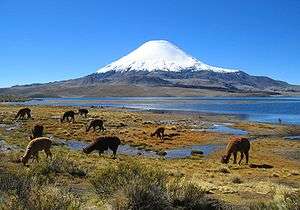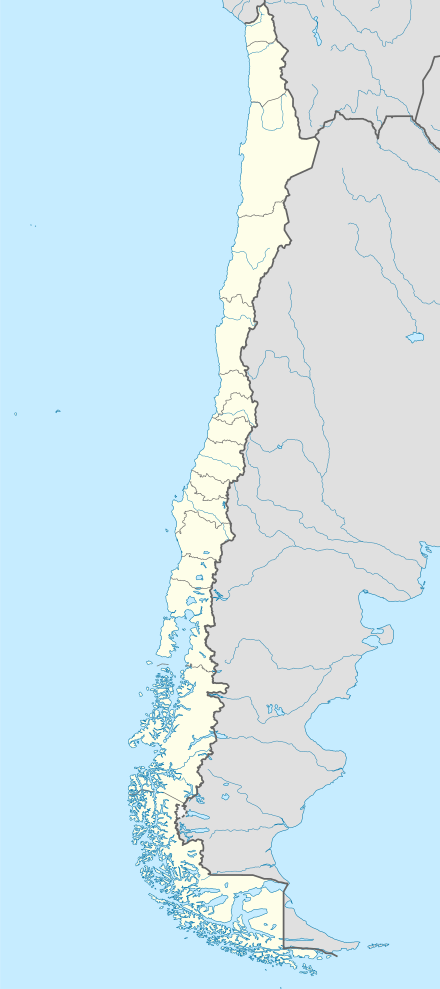Parinacota Province
Parinacota Province (Spanish: Provincia de Parinacota) is one of two provinces of the Chilean region of Arica y Parinacota. Its capital is Putre. It is named after the Parinacota Volcano.
Parinacota Province Provincia de Parinacota | |
|---|---|
 Parinacota Volcano | |
 Seal | |
 Location in the Arica-Parinacota Region | |
 Parinacota Province Location in Chile | |
| Coordinates: 18°11′47″S 69°33′34″W | |
| Country | |
| Region | |
| Named for | Parinacota Volcano |
| Capital | Putre |
| Communes | General Lagos Putre |
| Government | |
| • Type | Provincial |
| • Governor | María de los Ángeles de la Paz Riveros (EVOP) |
| Area | |
| • Total | 8,146.9 km2 (3,145.5 sq mi) |
| Population (2002 Census)[2] | |
| • Total | 3,156 |
| • Density | 0.39/km2 (1.0/sq mi) |
| • Urban | 1,235 |
| • Rural | 1,921 |
| Sex | |
| • Men | 2,106 |
| • Women | 1,050 |
| Time zone | UTC-4 (CLT [3]) |
| • Summer (DST) | UTC-3 (CLST [4]) |
| Area code(s) | 56 + 58 |
| Website | Government of Parinacota |
History
Arica y Parinacota Region was created on October 8, 2007 under Law 20.175, promulgated on March 23, 2007 by President Michelle Bachelet in the city of Arica. The law divided the former Tarapacá Region into two: the northern portion became the XV Arica y Parinacota Region, and the southern portion remained the I Tarapacá Region.
Geography and demography
According to the 2002 census by the National Statistics Institute (INE), the province spans an area of 8,146.9 km2 (3,146 sq mi)[2] and had a population of 3,156 inhabitants (2,106 men and 1,050 women), giving it a population density of 0.4/km2 (1/sq mi). It is the second least populated province in the country after Antártica Chilena and fifth most sparsely populated province. Between the 1992 and 2002 censuses, the population fell by 17.3% (659 persons).[2]
Administration
As a province, Parinacota is a second-level administrative division of Chile consisting of two communes: General Lagos in the northern portion and Putre in the south. The town of Putre serves as the provincial capital. The provincial government is led by governor Enrique Gaspar Ramos, who was appointed by president Sebastián Piñera.[1]
References
- "Gobiernos" (in Spanish). Archived from the original on July 7, 2011. Retrieved February 16, 2011.
- "Territorial division of Chile" (PDF) (in Spanish). National Statistics Institute. 2007. Retrieved 18 March 2011.
- "Chile Time". WorldTimeZones.org. Archived from the original on 2007-09-11. Retrieved 2010-07-28.
- "Chile Summer Time". WorldTimeZones.org. Archived from the original on 2007-09-11. Retrieved 2010-07-28.
